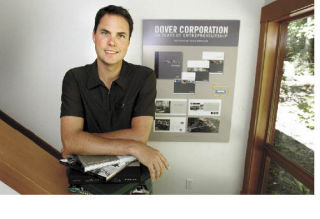Tim Connolly makes it his business to capture the essence of other people’s visions, through an artful and informative arrangement of imagery and text.
As he goes, he also tries to capture the essence of his own.
“I’ve always been nostalgic,” he said.
To that end, owner of the island’s Fenwick Publishing has gotten back to his roots as a photographer, with a twist: the work now on display at Treehouse Café chronicles his work-related travels, creating a collection with a story of its own to tell.
Back up to Connolly’s childhood in Old Saybrook, Conn., where he’d go out shooting – photos, not ducks – with his father.
Later, since there was no photography major at his college, he double-majored in history and art, using photography to accrue the necessary studio credits.
He came at publishing from the angle of marketing and project management, learning to produce gorgeous, high-quality coffee table books for corporate customers, to help enhance their brands. Clients over the years included the New York Rangers, the New York Yankees, and NASCAR.
Bainbridge beckoned, for a few reasons. Connolly’s wife is an island native, and they’d spent summers here fishing with her father. But he also realized that he was coming at his work from the standpoint of “making money, rather than a passion for making books.”
So here, first in a wooded cabin and now in a south-end studio, he has established Fenwick as a “non-traditional publishing house,” one whose books capture the history and culture of a variety of companies and organizations through books.
Not so different from Connolley’s chop-building days making books for NASCAR. But, a key distinction for Fenwick, this time he picks the projects.
Clients over the years have included real estate development company Hines, known for its long-standing sustainable business practices; product manufacturer Dover Corporation; and Milgard Manufacturing.
Projects of note to locals include Town & Country Markets – Fenwick published its 50th anniversary companion book – and the soon-to-be-released “In Defense of Our Neighbors: The Milly & Walt Woodward Story.”
Connolly art-directs every effort, and shoots some of the photographs. The glossy books reveal a careful attention to information design – the arrangement of images and text blocks, a consideration of the role of sidebars, the conveyance of spirit and importance through striking and poignant imagery, both original and archival.
That’s the part Fenwick does on Bainbridge. To gather data and images, which come from locales worldwide, Connolly travels. A lot. He’s also in China two or three times a year to oversee printing.
While Connolly is “on” during every trip, he’s often alone. Rather than eat up his free time watching television in the hotel room, he grabs his camera and walks.
He shoots what strikes his interest, capturing subjects as varied as an organic garden on Lamma Island to the southwest of Hong Kong, to the final night of the 2006 World Cup soccer tournament in Trieste, Italy, to the construction of a new printing press several hours from Hong Kong.
Half of Fenwick’s business, Connolly estimates, comes from family foundations that want to capture their mission and learn lessons from the past, so that visions don’t morph over time. Those bits and pieces of memorabilia, those side bars, those tactile remnants of a family’s history can speak volumes when compiled with care.
It’s a mission that in some ways mirrors that of Connolly’s own photographs. Standing inside Treehouse looking at the pictures he’s produced and mounted – a narrow distillation of some 15,000 photos taken over the years – he muses that when he’s traveling, he’s usually going so quickly that he barely has time to stop and absorb what he’s seeing.
“It’s almost as if you’re looking through glass – you’re observing it, but you don’t really feel it,” he said.
That’s part of why he shoots. So that later, he can look at and remember his experience with a little more leisure, and share them as part of his own legacy, just as he does for others through his books.
“I’m passionate about great stories, and about not losing those stories,” he said.


